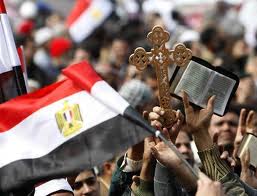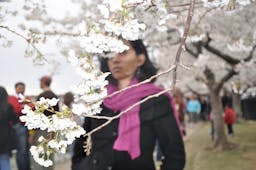I am Egypt: Bridging the gap between US vs. Them
Jan 21, 2015
Story

May, Mona and I had been working together at the same bank for over a year. We had a strong friendship that developed through the long hours we spent together daily at the same office. On one long weekend, we decided to travel together for the first time to the Red Sea. Our friendship grew to a whole new level on this trip; we did everything together from the moment we woke up to the moment we slept, for five days and nights. Our friendship grew closer with all these shared activities, but what deepened our relationship the most was the conversations we had about our relationships, work, family…and God!
The conversations usually flowed smoothly except when it came to discussing our spiritual faith and relationship with God.The first night I brought up the topic, May became very timid and told me: “You know, please don’t let us talk about this issue. We’ll start fighting on who is right and who is wrong and I don’t really want to go through this now.” As a Coptic Christian, I was curious to know how my two Muslim friends viewed God, not to argue, but to understand what really makes us different when it comes to our spiritual views. On our second night together, the topic was brought up again, but this time we felt more flexible discussing it. I asked them a question, “How do you see God?” and we took turns discussing our perspectives. We were cautious at the beginning not to offend each other, but slowly we became less self-conscious and started talking freely about it. I was surprised by the degree of similarity between our spiritual views. Although Islam and Coptic Christianity are very different religions, we as human beings had very similar views of God, and our emotions, thoughts and doubts were pretty much the same, too. On our way back to Cairo, I kept rewinding our conversations and it hit me that although I had had close Muslim friends since the first grade at school, this was the first honest conversation about faith and spirituality I had shared with my Muslim friends!
This wasn’t the case only with me. When I asked my Christian friends about how often they had deep and honest conversations with non-Christians about faith issues, the answer was usually “Never.” Many of the Coptic Christians in Egypt had a sense of mistrust and skepticism towards Muslims because of experiences of oppression and religious persecution, something that is common to religious minorities all over the world. These experiences led many Copts to isolate themselves from the surrounding society and confine themselves to Christian ghettos where the church plays a much bigger role than being just a place of worship.
On the other hand, many Muslims ignored the fact that Egypt is a religiously diverse country. Although Egypt is a predominantly Muslim country, where Muslims account for 80-90% of the population--the majority of which are Sunnis--there are other religions that have often been marginalized or neglected. Alongside Sunni Muslims exist a minority of Shi’a Muslims, as well as Muslims who follow the native Sufi orders. The largest religious minority in Egypt is Christianity, where the majority of Christians belong to the Coptic Orthodox Church of Alexandria. Other Christian minorities include Coptic Catholicism and various Protestants. Jews in Egypt were estimated to be a few hundred in 2004. In addition to Abrahamic religions, there are other unrecognized religions and beliefs such as Baha’i faith, Ahmadiyya Islam, and Egyptians who identify themselves as atheists or agnostics.
The apathy and reluctance from the Muslim majority and other religious minorities in Egypt to bridge the gap and build trust and empathy have created a general atmosphere of intolerance and hostility towards each other. Unfortunately, the gap among religions is getting wider due to many factors. First, living in a repressive society with little or no freedom of expression made it challenging for Egyptians coming from different religious backgrounds to discuss their faith freely with others in public spaces. This challenge was further doubled by the psychological fear and mistrust of the “other”. The lack of communication and dialogue between people of different religious backgrounds led to ambiguity about other religions and resulted in the spread of rumors and lies about the beliefs and practices of different religions. Second, the widespread practice of religiously segregated schools—or the segregation of religion classes at integrated schools-- and the appearance of the new wave of faith-based media in Egypt have widened the divisions between Egyptians of different faiths and led to the absence of "safe zones" where people of different religious backgrounds can exercise interfaith dialogue safely and freely. Third, the speeches and ideas of religious extremists have caused more hatred and divisions between different religions in the country, where they used different places of worship to promote their hate speeches.
All of these factors have contributed to more divisions and segregation between Egyptians of different faith backgrounds; and although, in the past, they all interacted in schools, universities and workplace, they remained silent about their religious background in fear of rejection. In many cases, encounters between Muslims, Christians and other religions were either hostile or passive and inattentive. The religious minorities in Egypt reacted to this environment of hostility by isolating themselves more and more from the surrounding community and embedding fear of the "other" especially through the attitudes and speeches given by the religious leaders in worship places. Many churches turned from being places of worship into comprehensive community centers where Christians were deeply involved only in the scope of their churches instead of being more actively engaged in the wider community.The hostility and fear about the “other” extended to not only include other religions, but other sects within the same religion—hostility between Sunni and Shi'a Muslims, and between Orthodox and other sects of Christianity, for instance.
However, the scene started to change gradually with the break out of protests in the streets in January 2011. Millions of Egyptians from different religious backgrounds flooded on to the streets to ask for freedom and social justice. At this historical moment, Egyptians transcended their differences.The Quran and the cross were raised in Tahrir square along with the Egyptian flag to announce a new inclusive Egypt.
Despite the unity of the Egyptian protestors in 2011, the sentiments shown in Midan El-Tahrir during the Egyptian revolution were obviously not enough to wipe clean the decades of religious intolerance and segregation. In the new era for Egypt, Egyptians of diverse religious backgrounds need to work hand in hand to rebuild their country and reap the fruits of the revolution. For this to happen, Egyptians—especially the youth—have to be proactive in dealing with religious diversity if they want to have harmony among various religious communities in Egypt.
For this harmony and understanding to take place, Egyptian youth coming from different religious backgrounds need to engage in a deep, authentic and respectful interfaith dialogue that will deepen their understanding of each other and appreciation of their diversity. For the dialogue to be effective, it needs to happen in a safe zone, where youth have the trust and freedom to tackle such a sensitive issue in their lives, and to engage in a transformative interfaith journey.
Lots of projects have taken place on ground to provide this space for youth to communicate with each other on a deeper level. Some projects have used arts and other creative tools that are sometimes more effective than verbal communication. One example of these projects is a book of short stories that was co-authored by Muslim and Christian friends who tell both shocking and strikingly humorous stories from their different religious communities. Another example is “Ana Masry”, a musical Egyptian band formed of Egyptian interfaith youth where their music is all about the richness of Egypt’s religious and cultural diversity.Other groups have used service and volunteerism as a way to bring Egyptians from different religious backgrounds together to engage in building one, unified community. This has proved to be a very effective way to build trust between people and embed within them a sense of having a shared cause, common goals, and a sense of unity. An example of this is the “Salafeyo Costa” group, a voluntary group that was established by a group of Muslims and who later were joined by youth coming from different religious backgrounds to help rebuild their community and engage in social and economic development programs. Such groups also provide the opportunity for youth to engage in discussions that revolve around important issues in their communities. An example of such an issue is gender roles and how different religions view men and women and the roles they play in a given community. Such discussions challenge the participants to view their communities in a different light, and use their critical and analytical skills to reflect on their beliefs, values and behaviors.
The more we have these safe spaces in Egypt where people from different faith backgrounds can come together to build a relationship of trust and empathy, the more we have hope in a more tolerant Egypt that embraces human diversity. Having these spaces is a necessity, as Dr. Martin Luther King put it: “Because we can never live apart, we must somehow learn to live with each other in peace.”
This article is part of a writing assignment for Voices of Our Future a program of World Pulse that provides rigorous new media and citizen journalism training for grassroots women leaders. World Pulse lifts and unites the voices of women from some of the most unheard regions of the world.




